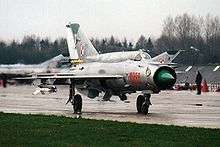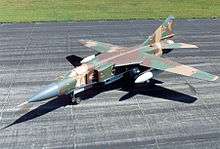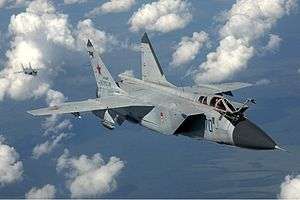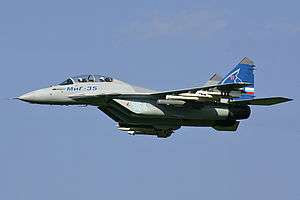Mikoyan
 | |
Formerly called |
|
|---|---|
| Division | |
| Industry | Aerospace and defense |
| Founded | Moscow, Russia (December 8, 1939) |
| Founder | |
| Products |
|
| Parent | United Aircraft Corporation |
| Website |
www |
Russian Aircraft Corporation MiG (Российская самолетостроительная корпорация «МиГ»), or RSK MiG, is a Russian aerospace joint stock company. Formerly Mikoyan-and-Gurevich Design Bureau (Russian: Микоян и Гуревич, МиГ), then simply Mikoyan, it is a military aircraft design bureau, primarily designing fighter aircraft. Its head office is in Begovoy District, Northern Administrative Okrug, Moscow.[1]
It was formerly a Soviet design bureau, and was founded by Artem Mikoyan and Mikhail Gurevich as "Mikoyan and Gurevich", with the bureau prefix "MiG." Upon Gurevich's death in 1976, Gurevich's name was dropped from the name of the bureau, although the bureau prefix remained "MiG". The firm also operates several machine-building and design bureaus, including the Kamov helicopter plant.
MiG aircraft are a staple of the Soviet and Russian air forces, and the Soviet Union sold many of these aircraft within its sphere of influence. They have been used by the militaries of China, North Korea, and North Vietnam in aerial confrontations with American and allied forces, and form part of the air forces of many Arab nations.
In 2006, the Russian government merged 100% of Mikoyan shares with Ilyushin, Irkut, Sukhoi, Tupolev, and Yakovlev as a new company named United Aircraft Corporation.[2] Specifically, Mikoyan and Sukhoi were placed within the same operating unit.[3]
List of MiG aircraft
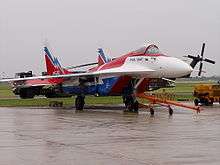
Production
- MiG-1, 1940
- MiG-3, 1941
- MiG-9, 1946
- MiG-15, 1948
- MiG-17, 1953
- MiG-19, 1954, MiG's first supersonic fighter.
- MiG-21, 1956, multirole fighter that would be widely exported and become the backbone of dozens of air forces. The MiG-21 is the highest selling jet fighter in world history.
- MiG-23, 1967 (third use of MiG-23 designation)
- MiG-25, 1965, interceptor fighter and recce/strike aircraft.
- MiG-27, 1970, a ground-attack aircraft derived from the MiG-23.
- MiG-29, 1977, a 4th generation multirole/air superiority fighter comparable to earlier and mid-life iterations of the American McDonnell Douglas F/A-18 Hornet, General Dynamics F-16 Fighting Falcon, and the French Dassault Mirage 2000.
- MiG-29M, improved variant, 4+ generation multirole/air superiority fighter comparable to the Chinese Chengdu J-10, later iterations of the American McDonnell Douglas F/A-18 Hornet and General Dynamics F-16 Fighting Falcon, as well as the Japanese-American Mitsubishi F-2.
- MiG-29K, 1988, 4+ generation multirole/air superiority fighter and the naval variant of the MiG-29M. Modern MiG-29Ks compete directly with Boeing F/A-18E/F Super Hornet. It also competes more indirectly with naval variants of the Chengdu J-10 and French Dassault Rafale.
- MiG-29M, improved variant, 4+ generation multirole/air superiority fighter comparable to the Chinese Chengdu J-10, later iterations of the American McDonnell Douglas F/A-18 Hornet and General Dynamics F-16 Fighting Falcon, as well as the Japanese-American Mitsubishi F-2.
- MiG-31, 1975, 4th generation interceptor.
- MiG-35, 2007, multi-role 4++ generation jet fighter (based on the MiG-29M), comparable to the American Boeing F/A-18E/F Super Hornet, European Eurofighter Typhoon, and Dassault Rafale.
Experimental
- DIS/MiG-5, 1941 (escort fighter)
- MiG-6, 1940 (reconnaissance/ground attack aircraft)
- MiG-7, 1944
- MiG-8 Utka, 1945
- MiG I-200, 1939, prototype for MiG-1
- MiG IP-201, 1941, MiG-1 modified into a testbed for an experimental machine gun
- MiG I-210/MiG-9, 1941, MiG-3 modified with a Shvetsov M-82 radial engine
- MiG I-211/MiG-9E, 1942, prototype high-altitude fighter developed from the I-210
- MiG I-220/MiG-11, 1943
- MiG I-221, 1943, high-altitude interceptor based on I-210
- MiG I-222, 1944, I-221 modified with a pressurized cockpit
- MiG I-224, 1944
- MiG I-225, 1944
- MiG I-230/MiG-3U, 1942, improved MiG-3
- MiG I-231, 1943
- MiG I-250 (N), 1945 (aka "MiG-13"), motorjet fighter prototype
- MiG I-270 (Zh), 1947
- MiG I-300, 1945, prototype for MiG-9
- MiG I-301T/MiG-9UTI, 1947, prototype trainer version of MiG-9
- MiG I-302, 1947, MiG-9 with relocated cannon
- MiG I-305, 1947, MiG-9 with a single Lyulka TR-1 engine
- MiG I-307, 1947, MiG-9 with RD-20F or RD-21 engines
- MiG I-310, 1947, prototype for MiG-15
- MiG I-320 (R), 1949
- MiG I-340, 1952, MiG-17 with Lyulka AM-5F engines
- MiG I-350 (M), 1951
- MiG I-360, 1952, precursor of MiG-19
- MiG I-370/I-1, 1955
- MiG I-380/I-3, 1953
- MiG I-410/I-3P, 1954
- MiG I-420/I-3U, 1956
- MiG I-7U, 1957, heavy interceptor fighter
- MiG I-75, 1958, swept-wing interceptor developed from the I-3
- MiG SM-12, 1957, developed into the MiG-21
- MiG SN, 1953
- Ye-2, 1955
- Ye-4/Ye-5, 1955
- Ye-8, 1962, experimental fighter aircraft
- Ye-50, 1956
- Ye-150, 1958
- Ye-151, cannon armed version of Ye-150
- Ye-152, 1959, fighter
- Ye-166, fictitious designation of Ye-152-1
- MiG-23 – (first use of designation) production designation of Mikoyan-Gurevich Ye-2A, 1956
- MiG-23 – (second use of designation) early name of Mikoyan-Gurevich Ye-8 (E-8/1 and E-8/2), 1960
- MiG-AT, 1996
- MiG-110, 1995
- MiG MFI objekt 1.44/1.42, 1986–2000
- MiG LFI project
- MiG-105 Spiral, 1965
- MiG-33
- Mikoyan LMFS
UAVs and drones
Naming conventions
MiGs follow the convention of using odd numbers for fighter aircraft. However, this naming convention is maintained not directly by MiG, but by ordering institutions, such as Ministry of Defence or Council of Ministers' Military-Industrial Commission (while in Soviet Union). The original designations for MiG aircraft are 2- or 3-digit numbers, separated by a dot. 1.44 or 1.42 is an example of original naming. Although the MiG-8 and MiG-110 exist, they are not fighters. The MiG-105 "Spiral" was designed as an orbital interceptor, contemporaneous with the U.S. Air Force's cancelled X-20 Dyna-Soar.
See also
Notes
- ↑ "Contacts." Mikoyan. Retrieved on 30 August 2011. "Russian Aircraft Corporation "MiG" 125284, Russian Federation, Moscow, 1-st Botkinsky drive, 7" – Address in Russian: "125284, Российская Федерация, Москва, 1-й Боткинский проезд, д.7"
- ↑ "Russian Aircraft Industry Seeks Revival Through Merger." The New York Times. February 22, 2006.
- ↑ Aviationweek.com
External links
| Wikimedia Commons has media related to Mikoyan-Gurevich. |
- Migavia.ru – official site of MiG "OKB" successor enterprise
- Russian Aviation Museum, MiG Pages

